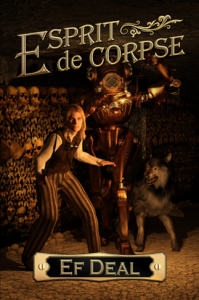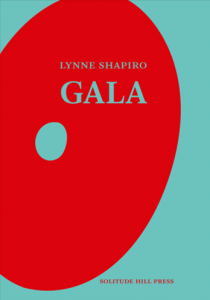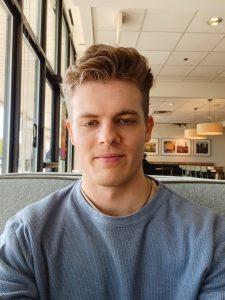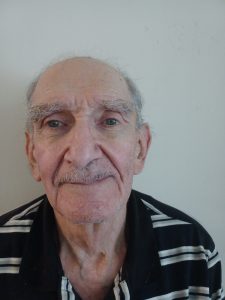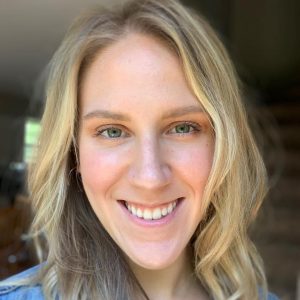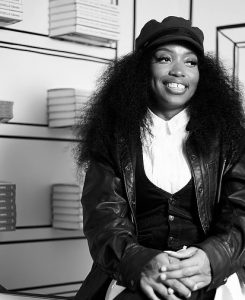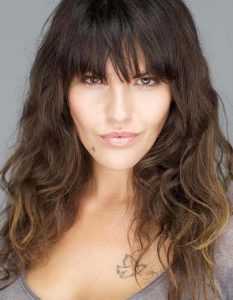
The vacation had been Ada’s idea, of course. The word “vacation” had also been Ada’s, although the term now seemed like a bit of a stretch. She’d buried the lead, speaking of the unspoiled beauty of the shoreline, the unfettered wildness of the vegetation, the local birdlife uncorrupted by centuries––nay, millennia––of mainland evolution. She’d used the phrase “private island” about a hundred times.
Now, in a canvas tent of their own slapdash construction, Emin was beyond un-thrilled. Even at the outset, in the exquisitely appointed breakfast nook she shared with Ada, she had been suspicious.
“It’ll be fun,” Ada had insisted. “You know, surviving together.”
“Isn’t that what we’re doing now?” Emin had said.
Ada had laughed, and Emin had laughed, and even Wilder, whose expressions most often began with a popped-out earbud and a theatrical eye roll, had laughed.
They had all known, even then, that the “vacation” would move forward. Ada took care of all the arrangements, as was her penchant, and Emin both teased and took pleasure in her instincts for fastidious fun. Ada had been this way about their honeymoon in Crete, the surprise Christmas in Bogotá, the business-turned-pleasure trip in Philadelphia shortly after they’d started dating. Beneath a pretense of spontaneity was something better: an unflappably focused assurance that everything would go to plan.
Always, but especially on occasions like these, Emin was both keenly aware of and totally unbothered by her irrelevance. She was happy to float through Ada’s life like an accessory, latched like a filter-feeding barnacle on a whale, beneficial but not strictly necessary. Wilder, Ada’s child, was similar. They’d given their mother access to a certain class of experience, the privilege of talking openly (albeit humbly) about giving life, the credibility of working motherhood, single motherhood, access to private school meetings and mommy message boards, a sheen of personhood as could only be enhanced by someone else’s. But they were, like Emin, a body in orbit, blissfully slung around whatever was at the center of Ada.
There had never been a man in the picture––Ada had built Wilder from scratch, a “one-woman experiment,” as she was fond of saying––and had been both thrilled and a little disappointed when it went so well. Wilder had never asked the whereabouts of Donor #11308D, had never required the therapy for which their mother had budgeted. They understood the role of a man in their existence the same way Ada did: vital, but more of a one-time donation than an ongoing contribution.
The proposed trip was, in part, intended as an occasion for Emin and Wilder to bond. Ada had fretted about the psychological ramifications of introducing a stepmother to the only child of an only parent, especially at the tender age of seventeen. What age isn’t tender? Emin had wanted to know. But the trip was irrelevant; she and Wilder got along fine. They were birds of a proverbial feather: Wilder the created one, Emin the curated one.
Wilder and Emin were so similar that they made similar jokes about the notion of a “survival vacation.” Emin teased that Ada had summited the peak of Maslow’s hierarchy and was now so bored she was starting over again at the bottom. Wilder’s joke was more novice and crass, simply that the pinnacle of the hierarchy was wedged firmly up Ada’s ass. In both instances, Ada was a good sport, amused that the event was already bringing them together.
They went to the REI on Lafayette together, the one that energized Ada and made Emin feel like trash, and picked out rain gear, long johns, headbands in slightly different colors and sizes. Afterward, they walked to Rubirosa, where all of their dietary restrictions were met.
Deep down, Ada harbored concern about Emin and Wilder’s facile, unfussy kinship. She hoped the trip would uncover something more profound, less superficial. She was delighted, obviously, by their camaraderie––Emin was the best, Wilder was the best; why shouldn’t they get along? ––but she didn’t trust it. She’d seen fighting fish in aquaria and knew, from her perspective as whatever metaphorical third-party fish was not a fighting fish, that it was only a matter of time.
“Survival has a way of bringing out the best in people,” she had told Emin in the kitchen.
“I think you’re thinking of the worst,” said Emin.
#
Before the survival excursion is the survival training, which is intended not only to teach hedge funders how to make fires, but also as a gentle segue between high-rise and toilet-less campsite. They will be alone on the island for ten days, with only their wits, numerous supplies, packaged food, toiletries, a sat phone, sunscreen, and a team of professionals with a speedboat on standby to protect them, so it’s fitting that their not-inexpensive “vacation package” would include training in the art of survival.
As they’re arriving, a gang of five tech bros is headed out.
Emin can’t help herself. She sways near Ada and whispers, “You’re sure you want to do something they want to do?”
But Ada is ready. Ada has been thinking about this for weeks. “I want to do what I want to do. Why must the paradigms of desire and experience be oriented according to the male hegemony? Why should my interests and actions––our interests and actions––be evaluated in relation to the impulses and behaviors of males, let alone males a fraction of our age, cis males for gods’ sakes, males in industries which are gutting our prospects for reconciling the wage gap and thwarting economic mobility for female and non-male-identifying workers?”
“For systemic reasons,” Wilder mumbles behind them.
A tech bro who’s just passed glances over his shoulder and snorts. Ada ignores him. “Alright, alright then, even so––even if everything we want and do is about what they want and do––why should they have all the fun? Why shouldn’t we have what they have?”
“Because they shouldn’t have what they have.”
At this Ada stops. She is delighted and horrified. She’s created a monster.
“The one-woman experiment worked,” Emin whispers. “You must be thrilled.”
#
The training camp on Kapiti Island is helmed by two guides: Tanemahuta and Ben. Tanemahuta is a Māori conservationist with a master’s in environmental science from Auckland. Ben is a former snowboarder and travel agent who, a few years ago, was “feeling a change.”
“See?” says Ada. “Something for everyone.”
They’re greeted at the entrance to the lodge by Ben, local representative for Aventura Regia. “More like an ambassador,” he says with a wink.
“More like a sycophant,” Wilder says under their breath.
Ben smacks his hands together like they’ve all just won something. “Welcome!” he says, gesturing them inside but not offering to help with the bags. Part of the process of acclimation toward self-reliance.
The interior of the lodge is all lumber and organic muslin, straying from natural aesthetics only when absolutely necessary. Ben is grinning about everything like he came up with it. “Dinner at six,” he says, “you. will. love it. Then a short video presentation, then orientation at eight tomorrow. Although if I were you” ––he punctuates his hype routine with an over-the-shoulder wink––“I’d get up at six thirty for that can’t-miss Kapiti sunrise.”
Wilder has earbuds in but can hear enough to roll their eyes.
Ada sets an alarm for six fifteen on her phone.
Emin is genuinely curious but has had enough with the winking.
Dinner is local and impressive: pūhā-laced toroi mussels and karengo dressed with karaka berries. Ada repeats every unfamiliar word aloud, eager to retain the knowledge. Wilder drinks sauvignon blanc with abandon, with no objection from Ada, who understands the trip to be a rite of passage; nor from Emin, who not only doesn’t believe in minimum drinking ages, but who considers parenting to be beyond the scope of her office; and certainly not from the staff, who, given what their guests pay, would let Wilder do lines of coke at the table if they wanted.
There’s a short presentation after dinner, redundantly designed to get the travelers enthused about something they’re already committed to doing. All along the walls, framed photos of past “survivors” beam down at them with identical rows of white teeth, different timbres of sunburn. A general sense of triumph prevails, though it’s hard to tell from the photos whether this is something the “survivors” acquired during the course of their adventures or arrived with on their own.
Tanemahuta shows up around seven thirty, confers quietly with Ben in the entryway while the dregs of dinner are cleared. Wilder, who’s insisted that a Polaroid mini camera is one of their “desert island items,” snaps a quick image of Tanemahuta, admiring in his mien the suggestion of a sympatico ennui.
Ben bids them all “a fond goodnight” with a light palms-together bow, which only Ada reciprocates, and Tanemahuta takes over the post-dinner orientation/presentation video, with considerably less fervor than Ben.
In the video, a San Francisco yogi in an orange halter-style bikini spears a fish. The fish, a tuna maybe, writhes on the tip of a branch she’s sharpened like a shiv with a knife she’s brought from home. In the YouTube version, there’s a link to buy the knife.
After the yogi, there’s a trio of brothers in near-identical variations of the same pullover sweater. Each looks stoned as hell.
Then there’s a talking heads segment, the CEO of Aventura Regia, mostly haircut, followed by footage of a bearded entrepreneur standing nude on a cliff, facing the water, limbs spread in gratitude to the universe. Ada and Emin, who have always found amusement in the male buttocks, share a private smirk.
The video is lousy with drone shots, all twirling around volcanoes, beaches, rock formations at a wildly fluctuating frame rate. The score is definitely stock music, but the expensive kind. Something with “victory” in the file name.
Wilder, who’s been quietly filching gum from the hospitality cart for the past four hours, applauds drably as the video winds to a conclusion.
“Any questions?” Tanemahuta asks.
Wilder snaps a mouthful of gum. “Has anyone ever died?”
“Not yet,” says Tanemahuta, and the way he winks, you can tell he was encouraged to wink more during a management meeting.
#
The next two days are a blur of naval-grade bowline knots and passably constructed fires, quizzes on poisonous leaves and K12 flashbacks to dissected dogfish sharks. On the third day, Tanemahuta, who’s mostly been teaching, stands back to let Ben, who’s mostly been announcing, announce that the team is ready for the wild.
As a graduation gift from the mandatory basecamp training, Ada, Emin, and Wilder are each given a guidebook, each in a slightly different color and size. In addition to invaluable footnotes on local flora and fauna, each includes a blank sketchpad section in the back, with an encouragement to “write what you see.”
Beauty, writes Ada.
#
Tangata Pokanoa, the “private island,” is roughly eighty kilometers north of Kapiti. It is, as promised, private as all get out, not even a fleck on maps of the Tasman Sea. Ada takes care to model excitement over this and other aspects of the trip, as she did when Wilder was a toddler, teaching them to appreciate ice cream and positive election returns.
Tanemahuta steers the speedboat into a designated cove on the western shore. Ben points out various trees from their various guidebooks. He’s right about half the time.
When they land, Wilder leaps from the boat before they’ve fully moored. Ada recognizes in their rashness an element of growing up, of going before one’s ready, of coming of age. Damp to the knees with seafoam, Wilder fishes the guidebook from their back packet and consults it. Feet planted in the unsteady surf, they look up, then down, then over their shoulder, grave with concern.
“That goat should not be here.”
“Right you are!” Ben exclaims, as though they’ve won a bonus round. He lashes the boat to the mooring, talking as he stumbles over the side, less elegantly than one might expect from someone whose job this is. “Goats were introduced to New Zealand in the ’80s––the 1780s––and then, for reasons not totally explicated, were sort of transported around to various islands.”
Behind him, Tanemahuta seethes.
“Turns out feral goats are pretty good for brush-clearing, but bad for other things,” Ben continues.
“Like… the ecosystem?”
“Yeah, exactly.”
Ada and Emin disembark with minimal pomp, each trying, in her own way, to be present.
The world is all blue and green, dripping with majesty. Indifferent ocean, algal profusions. Clots of gorse over icing-white sand.
“What’s gorse?” Wilder asks.
“Ah,” says Ben, grimacing. “They’re sort of––how would you put it, Tawny?”
“They’re the feral goats of the plant kingdom.”
“That’s it.”
They all take a walk around the shoreline adjacent to the cove, and Ben keeps gesturing with the full length of his arm. “The island is yours,” he says. “You can set up camp wherever you like.” Wilder watches as a feral goat bounds back into the dark through a patch of underbrush. “Though Tanemahuta can suggest some good spots if you want.”
“Happy to,” says Tanemahuta, although he doesn’t sound happy at all.
#
When the speedboat disembarks from the shore, Emin stands at the place where the water kisses the sand for a very long time. She is, despite herself, ecstatic.
The truth is, she has always wanted this life, this woman, this place.
She is, for the first time in a good long while, at ease.
#
Ada, Emin, and Wilder have agreed on a campsite (the spot suggested by Tanemahuta) by unanimous decision. “Not because he’s a man,” Ada says grandly, “but because he knows the island.” Then, looking pointedly at Wilder: “We don’t discriminate against men because they’re men any more than we’d like them to discriminate against us.”
Wilder cocks their head. “Yeah, I know.”
Ada leads them through the grubby fanfare of tent-building and fire-building with the enthusiasm of a den mother presiding over a gingerbread house contest. There’s a great deal of excitement at first but, despite six collective hours of knot training, they’re concurrently overqualified for and not terrific at it. Nonetheless, the tent––a sand-white flap strung between multiple half-assed knots––and the fire––a glowing slur of salvaged branches over the pre-packaged fire-starting kit––go to plan. In the end they are, one has to admit, magnificent.
“Christ, would you look at that?” says Ada. And she’s right, of course, it’s totally magnificent. It is inarticulably beautiful, this dumb tent and rollicking paint-by-numbers fire against the indigo swell of the Tasman Sea. Birds are everywhere. The gorse, whether it’s technically supposed to be here or not, is a flourishing civilization of flowers in caution-tape yellow and dusk-dark green. All is right with the world, for at least five meters in every direction.
#
Once the tent and fire are built, and in the absence of news, phone calls, closets, appliances, work, school, and the generic din wafting up from Spring Street, there’s not a whole lot to do.
So they find things to do.
Ada composes several works of hybrid poetry in the back of the journal gifted by Aventura Regia.
Emin reads her guidebook with alacrity. She builds fires, harvests edible flowers for garnishes on their half-planned/half-foraged meals. She learns about the local wildlife, on the whole less spectacular and less hampered by evolution: birds that can’t fly, mammals that can’t run, insects that can’t sting. She keeps reading, fascinated, but the general takeaway (as far as she can tell) is that evolution is a drag and that things should basically be left alone.
Wilder drinks moodily from their canteen and stares into the distance, but not toward the water. Emin asks what they’re up to, and they reply that they’re watching for goats.
Wilder, Emin, and Ada go on hikes and discover innumerable treasures: fluorescent-green flightless parrots, centipedes the size of your thumb, two-hundred-foot waterfalls. A mid-air rainbow because, according to Wilder, “science.” They have a picnic in a cave and Ada and Emin twine their fingers like an obscure braided pastry of which neither can remember the name.
They’re all lodging in the same tent, so Ada and Emin go on a conspicuously vaunted “walk” about which Wilder couldn’t care less. The sex is fast and hot and uncomfortable, with Emin pinned against the trunk of a kohekohe tree. Emin and Ada come at the same time and are profoundly grateful, with the unspoken understanding that every pleasure, no matter how gratifying, has a half-life.
#
By the end of Day Three, things are getting a little strange. Ada, who’s always loved good coffee and, to Emin’s chagrin, has occasionally touted this as a personality trait, has begun brewing coffee via the “sock method” introduced by Ben during Day Two of training. Emin has never hated Ada, not really, but when she devoutly calls something Emin’s grandmother has done for sixty years––something Emin’s worked very hard not to do, something she’s worked very hard to subvert with the likes of three-hundred-dollar espresso machines and other vestiges of assumed privilege, but nonetheless still knows how to make better than this affront––“cowboy coffee,” as Ben does, as though he came up with it, Emin hates her, just a little. It’s not a dealbreaker, but it’s not ideal.
When they go to bed, ten inches from Wilder, shielded by the flapping corner of their increasingly precarious tent, Ada rolls over and locks eyes with Emin, gaze glowing with “survival.”
“Don’t worry,” Ada says quietly, “nothing trite is going to happen. This trip isn’t going to dredge up weird shit like how you hang your shirts wrong or whatever.”
“What the fuck are you talking about?” says Emin.
Ada leans back, glamorously arched in the waning firelight like she’s about to say something crazy, but then, because they’re both extremely tired, they’re asleep before the conversation goes any further.
#
By Day Four, Ada has given up on inviting the other two to either sunrise yoga or sunset yoga, although what she did this morning was really just stretching. She’s read about how, prior to the widespread adoption of time zones, villages would set their clocks to noon whenever the sun reached its zenith in the sky, so this is what she’s done. Working from an illustrated fragment of text in her guidebook, she’s constructed a primitive sundial close to the tree line. It’s more aesthetically interesting than useful––she borrows Wilder’s camera to take a photo of her handiwork––but she takes pleasure in saying “Dinner’s at six,” and having it mean something.
By mid-afternoon, they’re all a bit hungry and bored, passive-aggressively reading books across the communal fire. Facing the forest and not the coast, Wilder is perched over a paperback copy of Julie of the Wolves.
Ada watches Wilder keenly over the haze of the fire, dunking a sock into a pot of tepid water.
“Why do you think they’re reading that?”
Emin, inspired by the pro-self language of her guidebook (actually Wilder’s), is lying against an unsteady pile of tōtara leaves at a forty-five-degree angle, trying to reclaim her tan. “Maybe it’s for school.”
“No. That’s a middle school book.” Ada bobs the sock in the water with the rhythm of whetting a weapon. “You think they’re trying to send a message?”
“Send a message?”
“That they’d rather have done the polar vacation.”
“No. No one wants that.”
“Or…” Ada softens. “Or they’re genuinely interested in survival.”
“Christ, who isn’t?” Emin means for it to sound playful, but it doesn’t. “I mean obviously they’re interested in survival. Recreationally.”
“Are you drunk?”
“How the hell would I be drunk?”
“I just feel like they’re reading it at me.”
Yesterday, while on the prowl for feral goats, Wilder offered to trade guidebooks with Emin. Emin agreed. Wilder’s had more pictures, more natural wellness tips, more artists’ renderings of botany and fewer of wildlife. Emin’s had more animals than plants, many of which were endangered or extincted, which she was beginning to find depressing. They didn’t find any goats, but Emin was grateful for the company.
Wilder offered Emin a sip from their canteen. Emin coughed, and Wilder blandly clarified that it wasn’t water, that they’d been stockpiling white wine for the duration of their training on Kapiti. Emin should have, of course, lectured them, but why? Who was to say Wilder didn’t know better?
There was a moment. An understanding.
Wilder laughed and then Emin laughed. It wasn’t even a whole scene. Just a moment, really. Hardly worth mentioning.
Truth is, it had occurred to Emin, just once, just for the splittest of split seconds, how fun it would be.
She used to go for younger girls. Not young young, obviously, but younger than she. Emin liked having something to offer.
“It’s normal to have involuntary sex dreams about people you know,” Emin’s therapist had once told her. “It’s inevitable.”
“Inevitable?”
“Normal.”
Emin had looked out onto a partial but legitimate view of the Park off 83rd. “I don’t need to be told I’m normal,” she’d said.
Her therapist had grimaced, then smiled, then said, “Copy that.”
Emin had dozed to the sound of custom pen on custom notepad, vision lapsing between lashes and leaves, sunlight glinting through slats of black tupelo and American elm.
And that had been it. Nothing had been resolved.
That had been the lesson.
“It’s not that you’re drunk. You just seem drunk.”
“Thanks,” says Emin. She turns away, as though she’s tanning each side of her face at intervals, but really because she’s had a lot of Wilder’s squirreled-away wine and is super drunk.
#
Over dinner on Day Six, Wilder is difficult to engage. They’ve become very concerned with the goats.
“Honey,” says Ada. “Honey, honey.”
Wilder, who has about two hours of battery life left before their contraband iPod becomes a glorified brick of trash, switches it off and turns slowly, for effect. “What if something dreadful happens?” they say.
“What are you talking about?” says Ada.
“If something happens to one of us. Do you think they’d really get here on time?”
“What is wrong with you? Of course they would. It’s in the contract.”
“I read about this woman on one of their South Pole trips. She was a total convict, and no one knew.”
“Well, that’s one of the good things about a trip like this,” says Ada. “It’s just us.”
#
The photo that winds up on the wall of “survivors” is taken on Day Six. It’s Ada, staring straight into Wilder’s Polaroid camera, pinching a two-inch crab between her thumb and index finger. In the photo, you can still see the dregs of her last manicure, from Lucky Nails on Seventh. The color is Khaki Vert by Chanel. Vogue will reference it briefly in a future article on “strong women.”
#
Wilder has spent the bulk of the “vacation” tracking down the creatures in their guidebook (really Emin’s), asking questions of no one, because there’s no one to ask and also no internet. On Day Seven, they find an insect the size of a gerbil scampering through a patch of gorse and are over the moon. “Can you believe it?”
“Yes,” Ada says confidently, although she’s doing something else.
“It’s a wētāpunga. The guidebook says it’s endangered. Almost extinct.”
“Really?”
“Here.” Wilder brings the guidebook to Ada, and they look at the entry together. Ada feels a nostalgic pang, a surge of déjà vu. She remembers this, her and Wilder perched just so over elementary school textbook passages on icebergs and rain forests, diagrams on South America’s slow secession from Pangaea. Wilder’s small fingers tracing the words of the informational display at the museum’s butterfly conservatory, eyes darting between the illustration and the real thing, near-panicked with fascination, as though they might have to choose.
“It’s one of the oldest animals on the island,” Wilder expatiates. “These little islands, they broke off from other landmasses like fifteen million years earlier than Australia––or, no, before the dinosaurs were extinct––so then other places got mammals like crazy, but here never did. So, you know how Australia’s like nine-for-ten or something on the world’s scariest insects?”
Ada nods, following along, maybe about to cry. She’s so proud of Wilder.
“But here never got mammals the same way, so without predators, the insects didn’t have to get scary. They didn’t have to survive. So instead of getting smaller and faster they got bigger and slower.”
Ada nods. “Survival makes us all better.”
“No, no,” Wilder says, talking so quickly that they interrupt their own laugh, “they are better. They’re basically mice or rabbits or whatever. On a long enough timeline, they’re essentially you.”
Ada laughs and squeezes Wilder’s hand. “Honey, you’re brilliant.”
The insect is lumbering so slowly that Wilder is able to get their camera from the tent and snap a photo before the creature’s made even a meter of headway. They wave the Polaroid like a fan, watching.
“This is the best part,” Wilder says. “Wētāpunga is named for a myth. It means the god of ugly things.”
The insect is undeniably ugly, Ada supposes, but in a sort of adorable way. Bulbous black eyes and flailing antennae, a plump, scaled body propelled by notched legs that seem to have no awareness of what the other legs are up to. It bumps against a bundle of undergrowth and then finds its way onward, clambering between the hazard-yellow flowers of the gorse.
“Wētāpunga,” she says, eager to retain the knowledge.
#
Day Eight is by far the worst. The shadow hasn’t even reached the tenth rock in Ada’s sundial before Wilder is stumbling out from the tree line, pinching a new Polaroid.
They head straight for the water, where Emin is standing barefoot, toes flirting with whatever flotsam and jetsam the Tasman Sea has to offer. Emin has in mind to procure some edible seaweed for dinner, which Ada has vociferously approved, but Wilder’s guidebook is more artsy than informative on the subject of sea plants. She turns at the sound of Wilder’s approach.
“Hey, kiddo.”
Wilder thrusts out the Polaroid. A grisly half-insect, definitely wētāpunga, split along the seams of the scales two thirds up its back. It’s crushed from the neck up, innards smeared over the cuplike shell of the carapace. Two legs hang like chopsticks draped over the lip of a cup.
“Christ,” says Emin. “Same one from yesterday?”
Wilder shrugs. They don’t know. “These fucking goats,” they say hoarsely.
“You don’t know it was them.”
Wilder clutches the photo with both hands now, careful not to touch the part with the pigmentation. “I touched it,” they finally say.
“What are you talking about?”
“I thought, when will I be this close again to something like this again, right? So, I touched its back and it stopped for just like a second, and then it kept going but like, what if it’s one of those things like when you touch a bird and then the mother bird won’t take it back? Or those two seconds altered the course of its day? So, you know, now it got stepped on? Because of me?”
Emin sloshes through the surf and pulls Wilder into a hug, careful not to disturb the photo.
From the entrance of the rapidly devolving canvas tent, well out of earshot, Ada sees them bonding and smiles.
“This wasn’t your fault,” Emin says.
“I mean, probably not, no, but in a truer, more historic way, yes.”
Emin isn’t sure what to say to this, so she turns back to the surf, where she’s just in time to see the next bad thing emerge. The Polaroid of the dead insect, along with the ensuing exchange, is why Wilder is also right there, and why there’s a second person to scream when it happens.
A thin ribbon of black swells up from the froth of the surf. The ribbon––a snake, in fact, its underside a vivid gorse-yellow––twitches its head curiously, as though gauging its prospects, then, with a decisive, bantamweight lunge, latches onto Emin just above the ankle.
Wilder, finally traumatized in a way that will require therapy, watches as Emin collapses and, with the snake still attached, stomps on its back with their bare heel. The snake lets go, and Wilder is unsurprised when it limply drifts off. They felt the vertebrae snap underfoot.
For a second, everything is quiet. It isn’t until Wilder places their hands on their knees and screams “WHY DID YOU BRING US HERE” that Ada realizes anything is amiss.
#
Emin opens her eyes to see Ada and smiles, vision bleary with a rush of affection. Ada is here. Ada will know what to do.
Up the coast, Wilder is photographing the corpse of the snake, which has washed ashore, like a forensic investigator.
Ada, who’s purchased every new edition of the EMS Field Guide since the year Wilder was born, has pulled Emin into her lap by the torso to elevate the heart above the wound. She’s traced the initial bite and marked the progress of the inflammation with a ballpoint pen. She’s pressing two fingers to Emin’s pulse with one hand, clutching the sat phone to her ear with the other. “What about the speedboat?” Ada shouts.
There’s a pause on the other end, slightly longer than the standard lag for a sat phone. “One of the fellows on Kaipahua,” Ben says grimly, “got himself bit by a stingray.”
“That is not a fatal injury!”
Ben clears his throat. “It can be if it takes a testicle.”
Emin laughs deliriously, maniacally, loud enough for Ben to hear. She gets it now, kind of, the sliver of fun women in labor must have. The all-access pass to honest reactions.
“Then get the goddamn helicopter here RIGHT FUCKING NOW,” Ada yells. Emin is still laughing.
Wilder races across the sand and drops to their knees, Polaroid and guidebook in hand. “Mom,” Wilder says. “Mom, mom.”
“Honey, what?”
“It’s a yellow-bellied sea snake. It’s––” Wilder drops their voice “––very. poisonous.”
“I thought you said they don’t have those here.”
Wilder shrugs, helpless, already crying like it’s their fault. “I don’t know,” they say, “I don’t know anything.”
“We thought it was extinct,” Ben says over the sat phone, “but they found one in New Zealand––”
“I DON’T NEED YOU TO BE FUCKING PBS, BEN. I NEED THE FUCKING HELICOPTER.”
“It’s already on its way.” The way he says it, you can tell Ben is crying.
Emin, for her part, has never been more in love. This is the Ada she knows, survival Ada, whether or not survival is required. Right even when she’s wrong. Ada who works out and knows all the right creams, who looks good from every angle. Ada who’s going to take her to Egypt in the fall.
It seems extremely possible, in this moment, that Emin will die. She wonders what it would be like, to be an occasion. A calendared tragedy. A perfectly good date, annually ruined. She wonders whether Ada would resent it or be into it.
Emin remembers a line from the orientation video that made her laugh:
We are prepared for every reasonable contingency.
She can imagine this word in court, reasonable, the lawyer practicing it in front of the mirror.
If Emin dies, Ada will blame herself, then the travel company, then the tech guy with one testicle, then the island itself. Her stages of grief will be the different entities she blames. The snake, interestingly, will never make the list.
Overhead, a cloud shifts from something that looks like a whale to an eel, one part of the cloud outpacing the others.
Ada monitors her symptoms. They’re all textbook, trite. Numb fingertips and toes, shuddering limbs, heart palpitations. The works.
The emergency helicopter will get here in time, probably. It’ll be a story they tell over cocktails at New Year’s. She imagines the polite gasps of their guests, the play-acting of who should tell it. Emin will tell it, but her version will lack important details. Ada will jump in to help.
Wilder rocks in the surf, knees hugged to their chest, while Ada strokes sweat from Emin’s brow, monitors the wound, glances around the perimeter for nonexistent threats. Her face hovers above Emin’s face, eyes focused but frenetic with concern. The fussy, frustrated attentiveness of nothing-to-be-done.
Dipping in and out of darkness, Emin imagines Ada’s face over the lip of a coupe glass, flushed with remembered worry.
In the end it’ll be her hand on Ada’s arm, reminding her that the danger is past now.
A.J. Bermudez is an award-winning writer, filmmaker, and Editor of The Maine Review. Her first book, Stories No One Hopes Are About Them, won the 2022 Iowa Short Fiction Award as was a 2023 Lambda Award Finalist. Her work has appeared in a number of literary publications, including The Kenyon Review, Virginia Quarterly Review, Boulevard, Story, Creative Nonfiction, and elsewhere. She is a former boxer and EMT, and is a recipient of the Diverse Voices Award, the Page Award, the Alpine Fellowship Writing Prize, and the Steinbeck Fellowship.
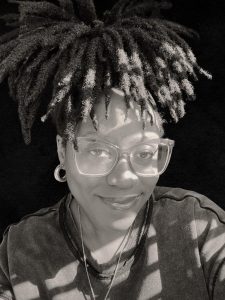 PHILADELPHIA, PA (April 2024) – Philadelphia Stories is thrilled to announce LaVonna Wright of Lithonia, Georgia (left) as the winner of the 2024 National Poetry Contest. This year’s contest was judged by poet Kirwyn Sutherland whose work has been published in American Poetry Review, Cosmonauts Ave., Blueshift Journal, Voicemail Poems, APIARY Magazine, FOLDER, The Wanderer and elsewhere. Kirwyn has served as Editor of Lists/Book Reviewer for WusGood Magazine, poetry editor for APIARY Magazine, and is a Watering Hole fellow. Kirwyn has a chapbook, Jump Ship, on Thread Makes Blanket Press. LaVonna Wright will be awarded $1,000 for “A Song for Anna Mae.” Wright and the runners up, honorable mentions, and editor’s choices will be honored at a reception next month in Philadelphia.
PHILADELPHIA, PA (April 2024) – Philadelphia Stories is thrilled to announce LaVonna Wright of Lithonia, Georgia (left) as the winner of the 2024 National Poetry Contest. This year’s contest was judged by poet Kirwyn Sutherland whose work has been published in American Poetry Review, Cosmonauts Ave., Blueshift Journal, Voicemail Poems, APIARY Magazine, FOLDER, The Wanderer and elsewhere. Kirwyn has served as Editor of Lists/Book Reviewer for WusGood Magazine, poetry editor for APIARY Magazine, and is a Watering Hole fellow. Kirwyn has a chapbook, Jump Ship, on Thread Makes Blanket Press. LaVonna Wright will be awarded $1,000 for “A Song for Anna Mae.” Wright and the runners up, honorable mentions, and editor’s choices will be honored at a reception next month in Philadelphia.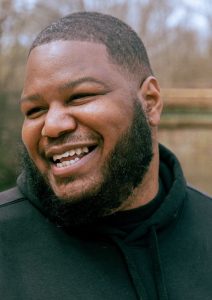 To continue our poetry celebration, our contest judge, Kirwyn Sutherland (right) will lead a masterclass webinar on Sunday, April 7th on the topic, “Rearranging Erasure.” Details on the webinar may be found at https://secure.givelively.org/event/philadelphia-stories-inc/masterclass-with-kirwyn-sutherland. In addition, we will honor the winning poets of the poetry contest in an afternoon reception on Saturday, April 20 at 3pm at the Kanbar Performance Space at Thomas Jefferson University’s East Falls campus, which will be free and open to the public.
To continue our poetry celebration, our contest judge, Kirwyn Sutherland (right) will lead a masterclass webinar on Sunday, April 7th on the topic, “Rearranging Erasure.” Details on the webinar may be found at https://secure.givelively.org/event/philadelphia-stories-inc/masterclass-with-kirwyn-sutherland. In addition, we will honor the winning poets of the poetry contest in an afternoon reception on Saturday, April 20 at 3pm at the Kanbar Performance Space at Thomas Jefferson University’s East Falls campus, which will be free and open to the public.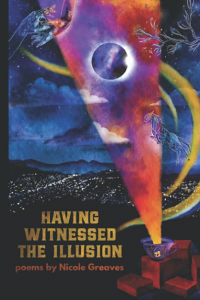
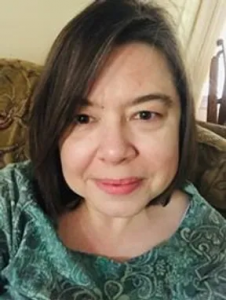 Nicole Greaves’s poetry has appeared in numerous literary reviews––including SWWIM, Cleaver Magazine, Matter Poetry, American Poetry Review; Philly Edition, Radar Poetry––and was awarded prizes by The Academy of American Poets and the Leeway Foundation of Philadelphia. She was a finalist for the 2020 Frontier Digital Chapbook Contest and a 2015 finalist for the Coniston Prize of Radar Poetry, who also nominated her for The Best of the Net. She was selected by Gregory Orr as the 2003 Poet Laureate of Montgomery County, Pennsylvania.
Nicole Greaves’s poetry has appeared in numerous literary reviews––including SWWIM, Cleaver Magazine, Matter Poetry, American Poetry Review; Philly Edition, Radar Poetry––and was awarded prizes by The Academy of American Poets and the Leeway Foundation of Philadelphia. She was a finalist for the 2020 Frontier Digital Chapbook Contest and a 2015 finalist for the Coniston Prize of Radar Poetry, who also nominated her for The Best of the Net. She was selected by Gregory Orr as the 2003 Poet Laureate of Montgomery County, Pennsylvania. 